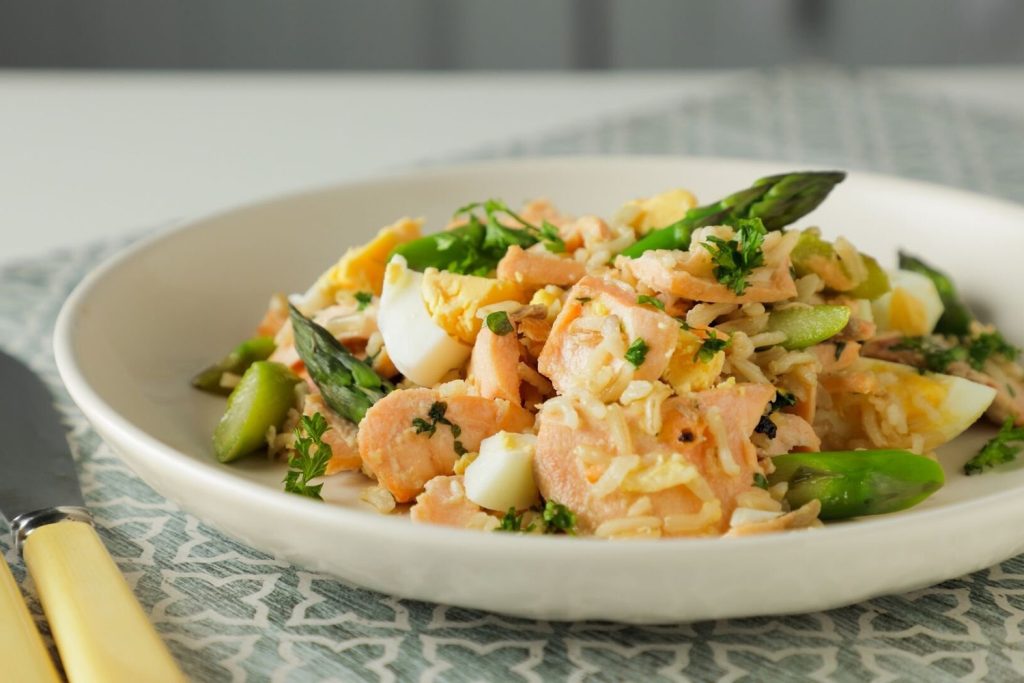Salmon Kedgeree
A hearty comfort food, perfect as a breakfast or dinner

Ingredients:
– 2 Salmon fillets
– 75g Brown rice
– 2 hard boiled eggs
– Asparagus tips
– Butter
– Parsley
– Lemon
– Salt and pepper to taste
Method:
1. Start by heating your oven to 180°C
2. Season the salmon fillets with salt and pepper and squeeze the lemon juice over the fish
3. Cook the salmon in the oven for 10 to 12 minutes
4. Heat a pan of hot water until boiling and add a pinch of salt
5. Add the rice into the pan and cook for 10 to 12 minutes
6. Flake the salmon into small chunks
7. Gently heat some butter in a pan and add the rice and salmon
8. Cut the 2 boiled eggs into quarters and add to the rice and salmon
9. Finely chop some parsley and asparagus tips, add them both to the other ingredients
10. Season to taste and serve
Enjoy, Happy Cooking!
Why We Chose These Ingredients
Salmon
Salmon is an excellent source of omega-3 fatty acids. As well as boosting the body’s defences, omega-3 has been found to be of great benefit in the treatment of several mental health conditions. Researchers have discovered beneficial results in cases of depression and bipolar disorder (depressive phase) when higher levels of omega-3 were introduced. Those on a diet high in omega-3 were over 22% less likely to develop more severe symptoms associated with their condition. Salmon is also a great source for vitamins A and B as well as the minerals magnesium, calcium, potassium, phosphorus, zinc, and selenium.
Studies have suggested that a lack of vitamin B and vitamin D may be linked to lowered mood and depression. Vitamin B deficiency has also been linked to cognitive conditions such as poor memory and dementia. Folic acid, another form of vitamin has been found to play an important role in our mood and research suggests that it is effective when combined with certain antidepressant medications. Aside from their benefits to mental health, vitamins are vital to our overall health and aid in the repair of the body’s cells as well as aiding digestion.
Diets with reduced levels of zinc have been shown to be associated with reduced mood and depression. Also, research has suggested a possible link between an increased effectiveness of some antidepressant medications when taken alongside zinc13.
Magnesium also plays an important part in our health and has been recognised for it’s role in alleviating symptoms of depression14. Healthy levels of magnesium have been shown to help the body regulate stress which in turn helps with symptoms of conditions such as anxiety15. Other research has suggested that low levels of magnesium in our diet contributes towards conditions such as Diabetes, inflammation and high blood pressure.
Brown Rice
Unlike white rice, brown rice has not been stripped of it’s nutritious bran and germ. Brown rice is a good source for the minerals calcium, iron, manganese, magnesium and selenium. Rice is also a source of vitamins B1 and B6. Brown rice has been linked to helping to prevent several serious illnesses including Diabetes and various heart problems.
Asparagus
Asparagus is an excellent source of vitamins and minerals whilst also being low in calories. A small portion (90g) of asparagus contains only around 20 calories but is packed with healthy nutrition. Vitamins C, A, E and K can be found with asparagus offering over half the daily recommended amount of vitamin K and almost a fifth of vitamin A. In addition to this asparagus also contains the minerals potassium and phosphorus. Vitamin K has been linked to healthier bones and vitamins E and C are antioxidants which protect the body from free radicals and oxidative stress. If that weren’t enough, asparagus is high in fiber which can improve our digestive health and helps nurture healthy gut bacteria.
Watch the Step by Step YouTube Video:
Disclaimer
The information presented here is designed to help the reader on their own path to making healthier nutritional decisions and we would encourage you to read as much as possible around the subject and form your own conclusions. The information presented here does NOT constitute medical advice. If you are unsure about any health or nutritional issues please contact a qualified professional. Always consult your doctor before changing your diet or beginning any big lifestyle changes. The foods presented here should not be thought of as a quick cure for mental health conditions. A balanced diet, alongside regular exercise and any prescribed medication should always be recommended in the first instance. If you experience any changes in your condition or health as a result of dietary or lifestyle changes, consult your doctor immediately.
Sources – Click Here
Contribute to Cook Yourself Happier
Cook Yourself Happier is a Non Profit Social Enterprise. 100% of every donation is greatly appreciated and goes towards spreading the word about the positive link between food and mental health through demonstrations, workshops and online content.
